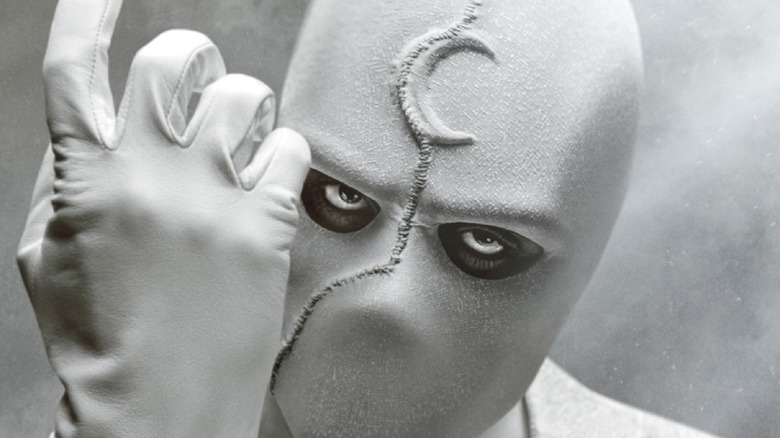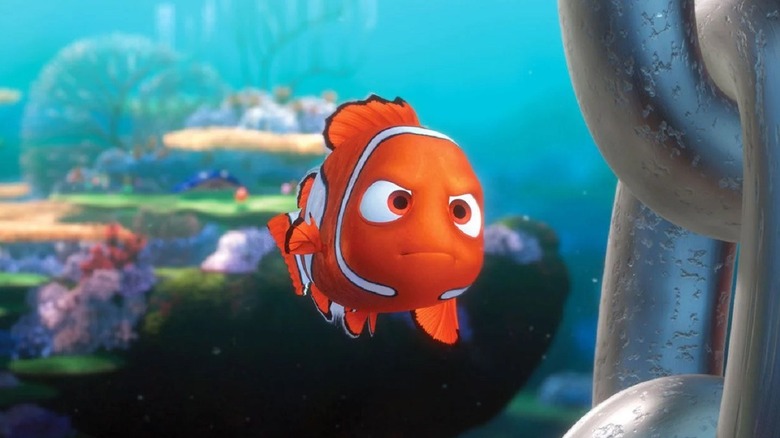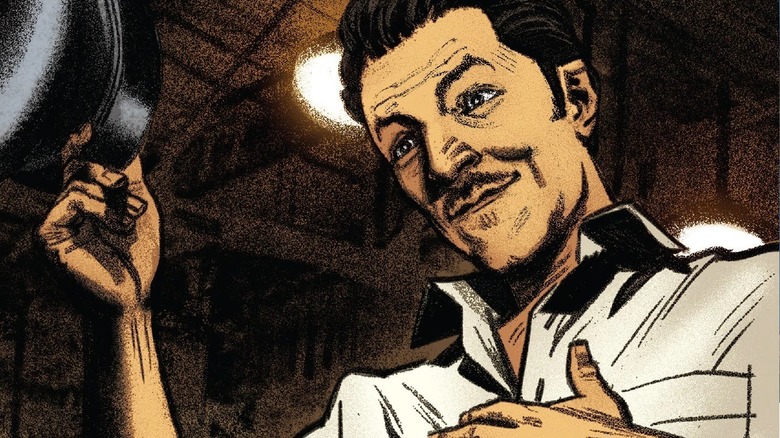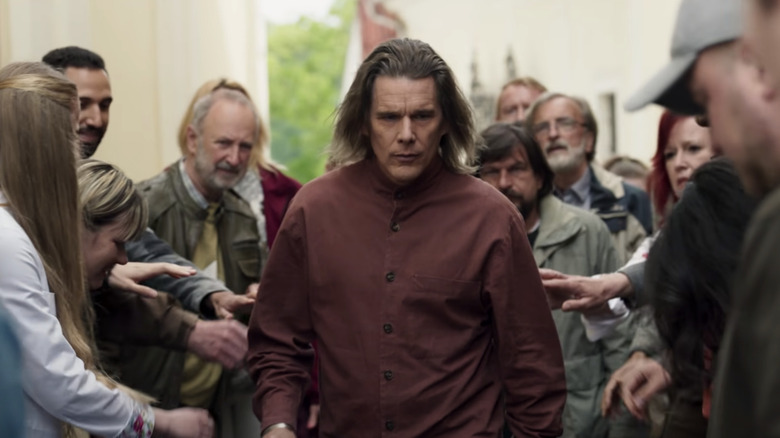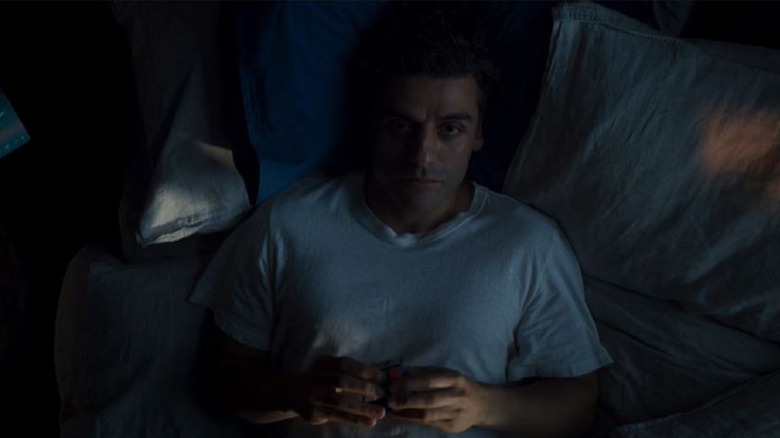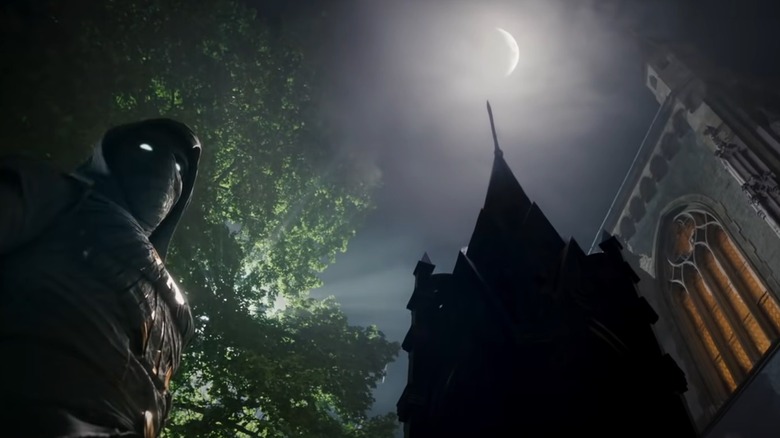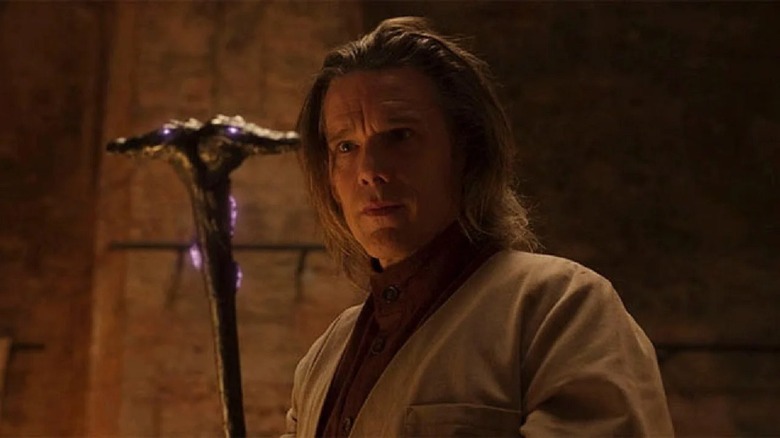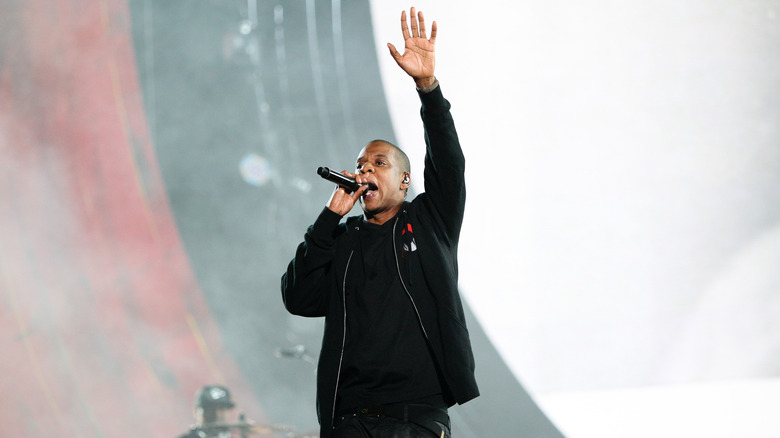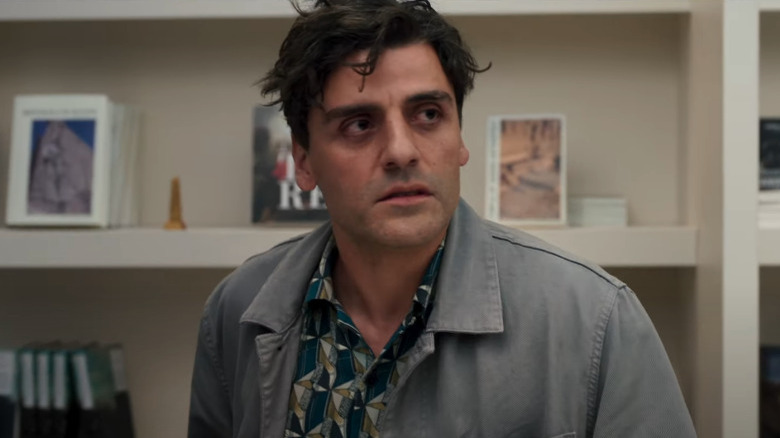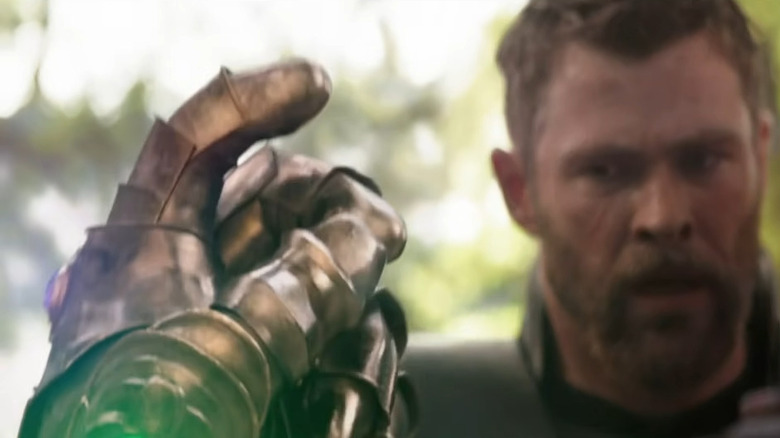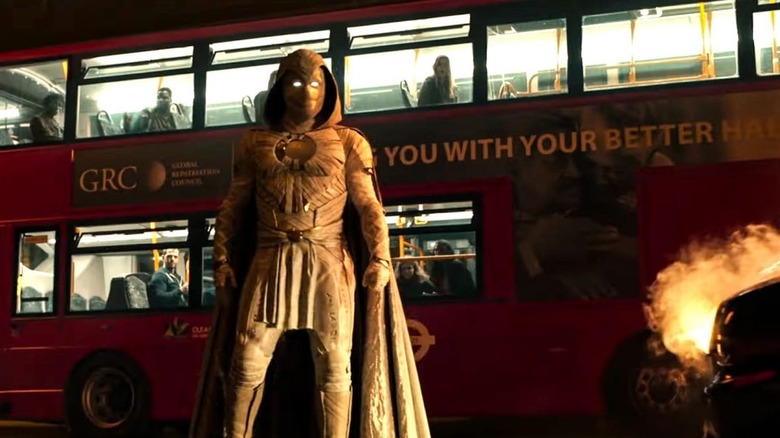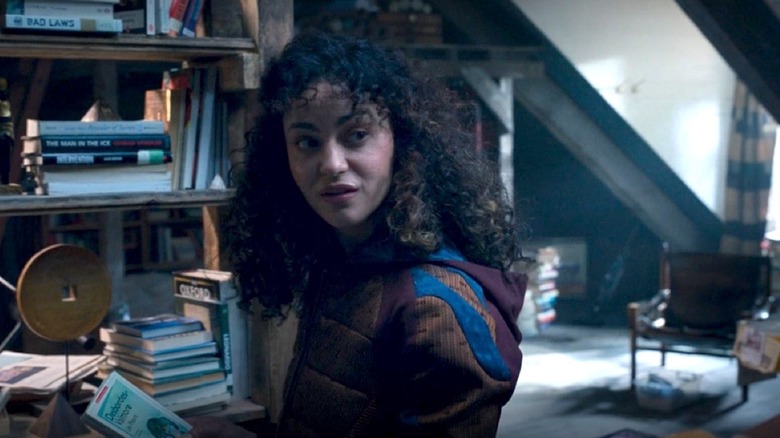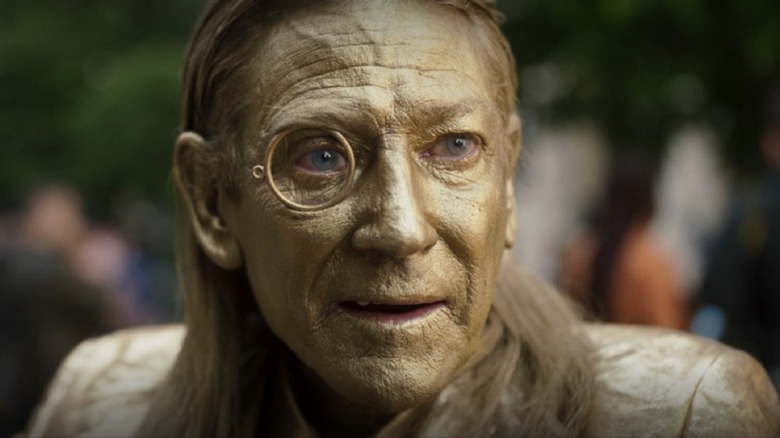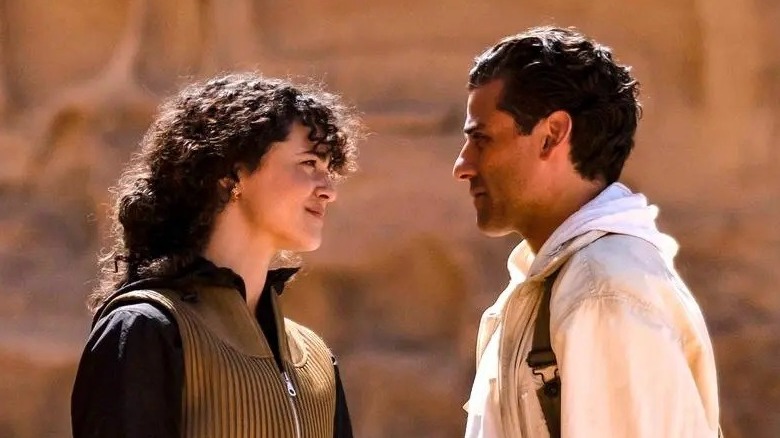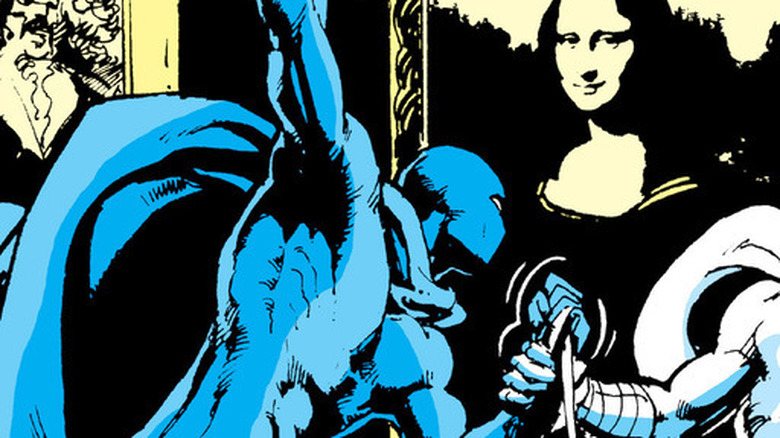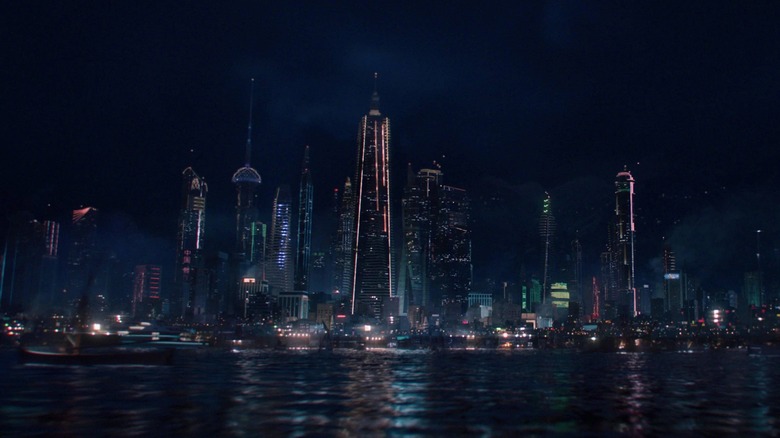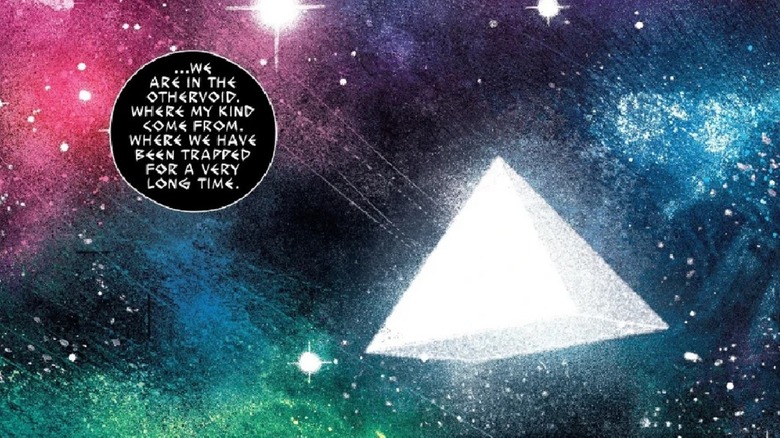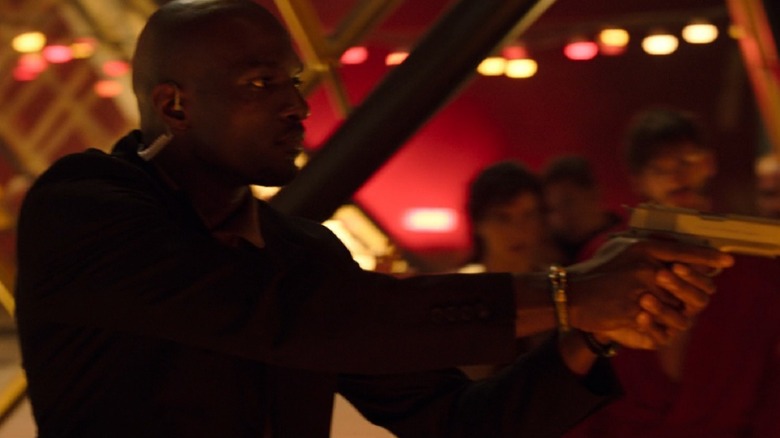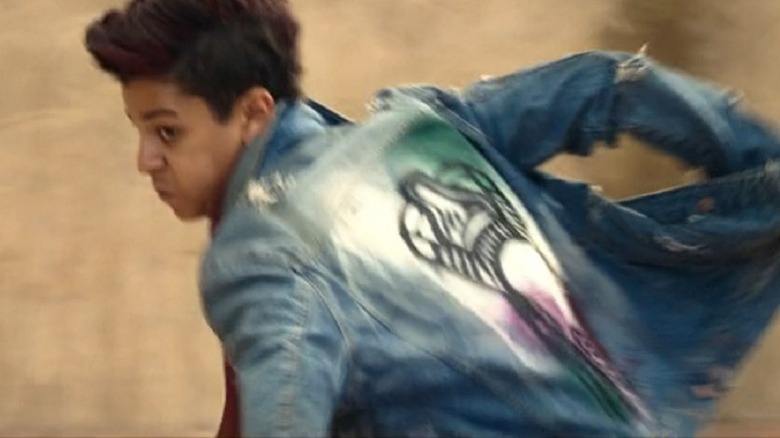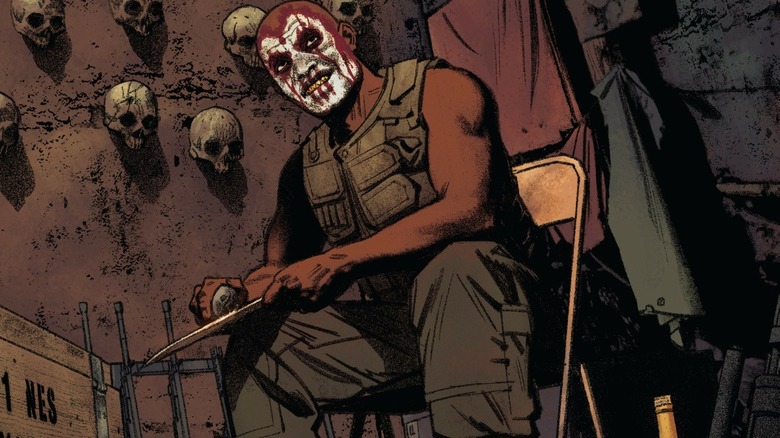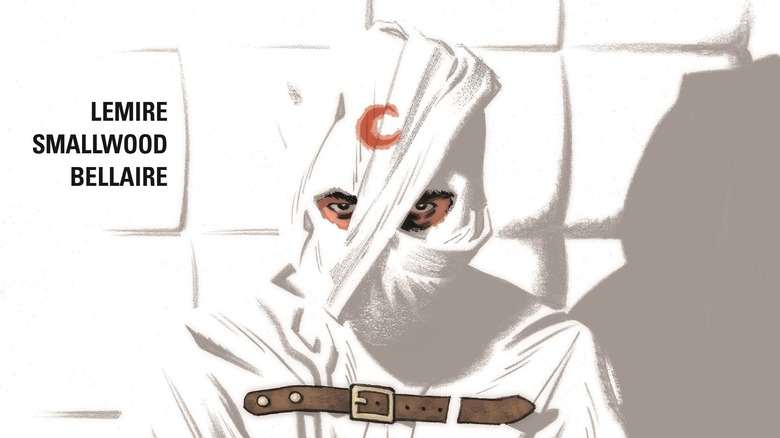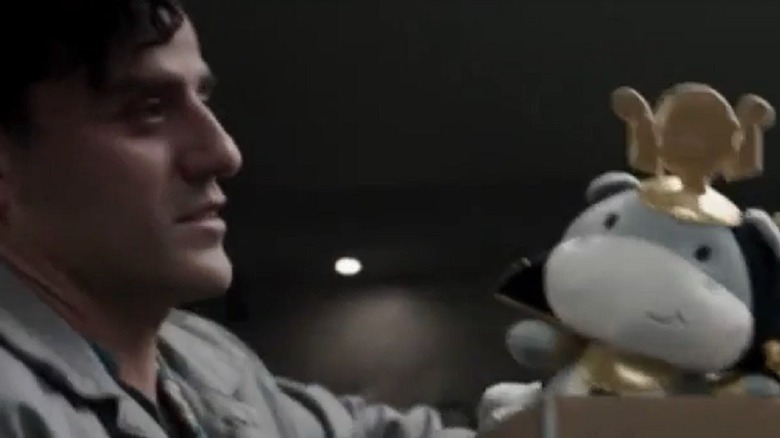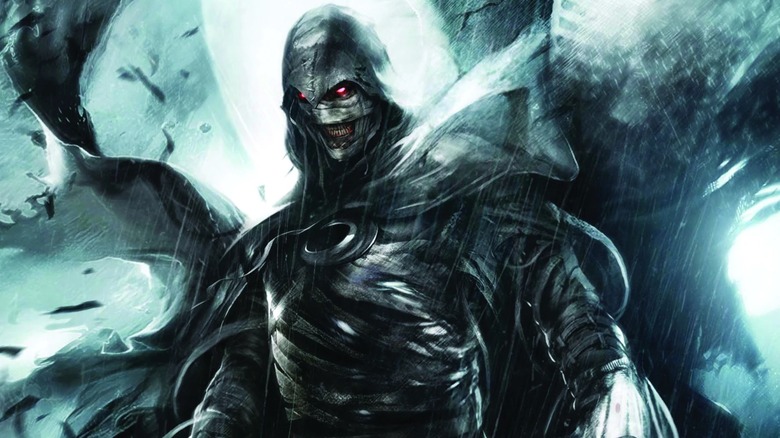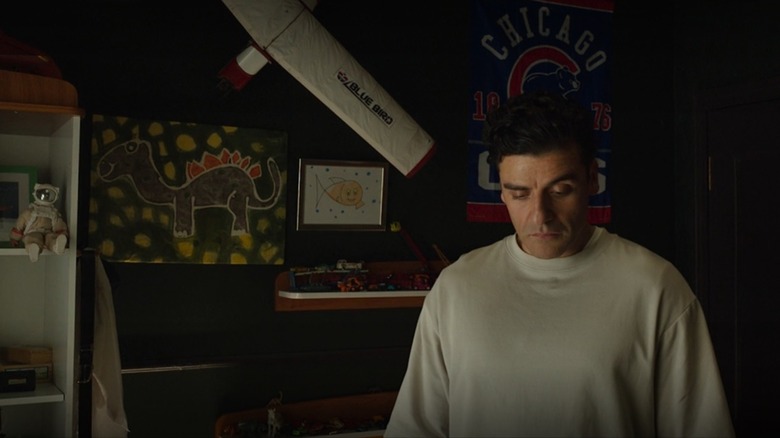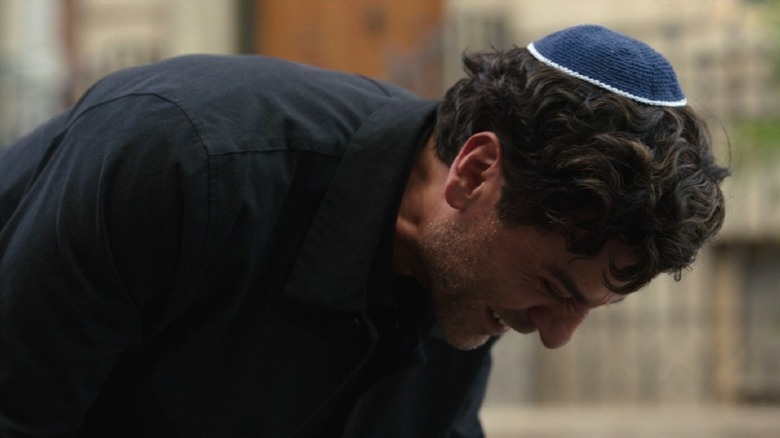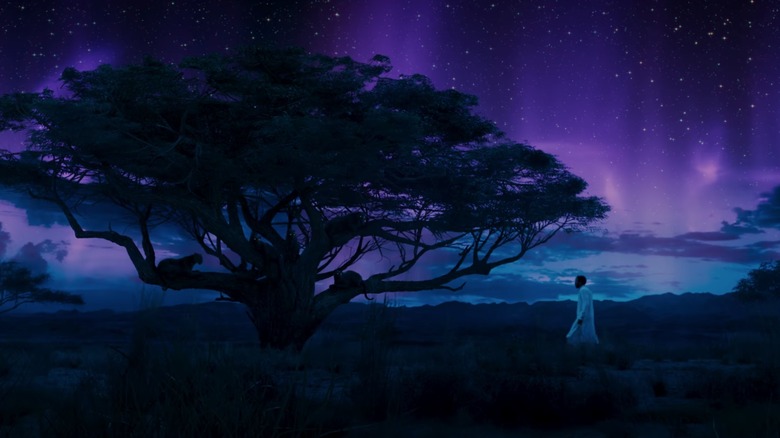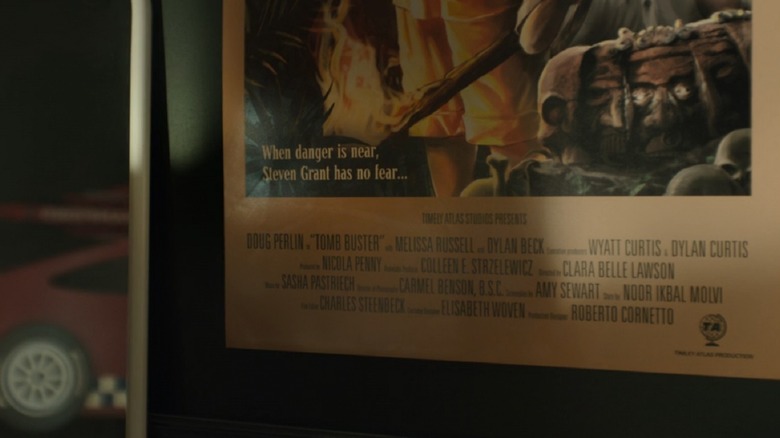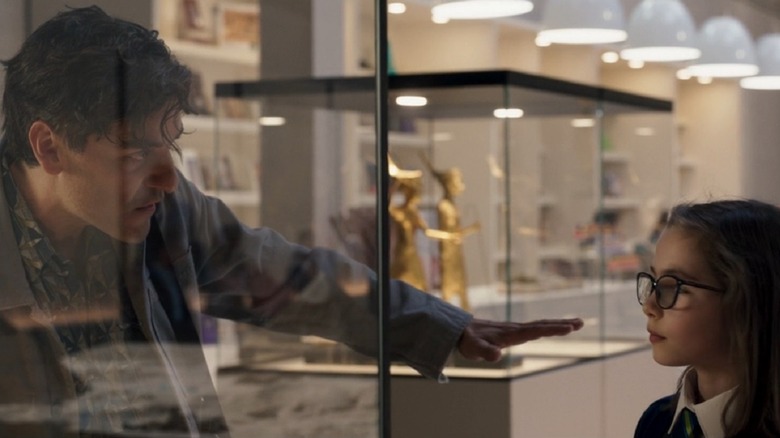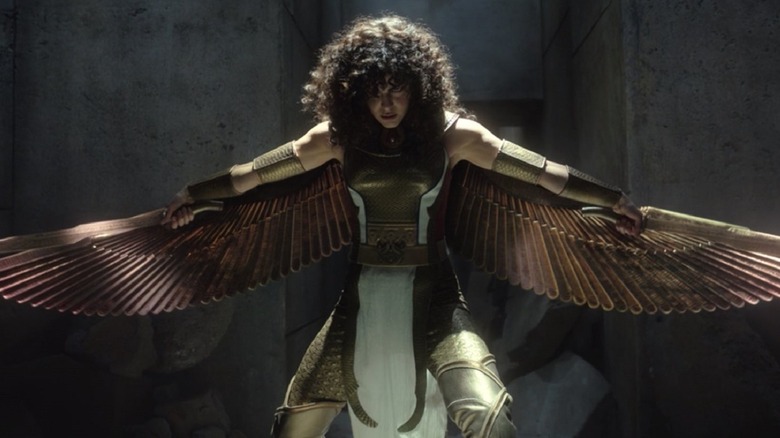Easter Eggs You Missed In Moon Knight
One of Marvel's lesser-known but impactful heroes is almost at full power as his show debuts on Disney+. Moon Knight is making his presence known to MCU fans with a six-episode miniseries. These episodes aren't going to drop the audience at the beginning of the story either, as they forego the standard origin and take an interesting path of how to present the character, as well as his other personalities.
The vigilante in all white will be making his way to various parts of the world, as "Moon Knight" dives deep into gods, mysteries, the mind, Egyptian mythology, and exposes secrets that can tear relationships asunder. The show may feel like a slow burn at times, or a little jarring when it jumps around, but there is a lot happening in between the mystical elements and outward brutality.
"Moon Knight" contains plenty of subtle Easter eggs and comic tie-ins that might be tough to catch on one viewing, while other more obvious pop-culture references are blatant and left to linger, but there are definitely some interesting observations to point out and breakdown.
The Disney family
Many television shows love referencing other series and big blockbuster movies. Even if it doesn't quite fit into the plot, these nods are often used as relatable moments or quick jokes. "Moon Knight" does plenty of this, and somehow manages to keep it all in the current Disney family (almost). The show itself was pitched partly as being akin to the "Indiana Jones" films, which came over in 2012 with the purchase of Lucasfilm, and several shots in later episodes make that particular influence apparent.
In the first episode, Steven Grant owns a fish named Gus that he refers to as a "one-finned wonder," similar to the titular in Pixar's "Finding Nemo." Later, when Grant questions the woman at the pet store, she replies with, "I don't care what that Nemo movie says," cementing the reference and causing viewers to contemplate what happened to Gus.
Later on, in the first episode, Harrow mentions the word "avatars" to Grant when he confronts him in the museum, which prompts Grant to reference James Cameron's "Avatar." Because of the Fox acquisition, that series is now also owned by Disney, as is "The Simpsons." In Episode 5, Steven Grant mentions that Harrow's new look is, "very Ned Flanders," referencing the Simpsons' neighbor.
Frenchie on the phone
It has to be weird to find an unfamiliar flip phone hidden in your home, especially when it has thirty-plus missed calls from someone else's ex. Amongst the many notifications of "Layla" though sticks out the singular instance of another caller, "Duchamp." Though the name is clearly important, it won't ring any bells for those unfamiliar with the comics. The character, who Marc Spector calls "Frenchie," is a big part of the books — but it doesn't look like we will be seeing him in the show just yet.
Jean-Paul Duchamp was a soldier, like Spector, but one who joined the French Legion. He was a mercenary when the two met. He spent many issues fighting alongside his comrade, not only as a soldier and his personal pilot, but as a close friend as well. His association with Moon Knight and others often put him in danger, which saw the loyal companion get beaten badly on occasion, and even required him to use cybernetic leg enhancements at one point to walk. Duchamp's closeness with Marc was also explored when the character came out as gay, but the two would continue to remain just friends. Frenchie began dating his physical therapist and opened a restaurant. Though Duchamp seems to have moved away from the action-adventure lifestyle in the comics, this Easter egg implies he might have a big role in the show one day.
What's in a villain's name?
Ethan Hawke does an amazing job as the primary antagonist of "Moon Knight," Arthur Harrow, but no one should be discouraged if they don't recognize this particular villain or know what he's about. Harrow only appears in one issue of the comic, "Moon Knight #2" from 1985. Though he makes an impression, it appears all the show really wanted was his name. The actual comic book character was a geneticist who studied the lengths at which humans experience and deal with pain, eventually creating soldiers who couldn't feel it. All of this knowledge was gained from experiments that involved torturing various subjects, mostly during World War II.
The opening scene of "Moon Knight" sees Harrow putting glass in his shoes and walking in them as some type of self-flagellation, and he is shown to have an enormous number of followers. These aspects of the character had most readers believing that he could also be a version of the villainous Sun King – but the powers, and the fact that Harrow serves Ammit, The Soul Eater, don't quite add up to that. This makes sense: Why wouldn't the creators save someone that hot for another adventure later on?
All clad in white
There are a lot of great superhero costumes, but white is seldom a major color in most of them, especially for vigilantes. Who would make an entire suit white while operating mostly after dark? Moon Knight, that's who. The explanation is simple though, he's an avatar, dispensing justice, a symbol for Khonshu. Spector wants to be seen and easily identifiable, to strike fear into his prey when he comes after them, but it also looks cooler when he has their blood all over him.
In many superhero movies, the characters will wear their preferred color schemes even in their secret identities or normal lives, but it's usually a subtle stylistic choice or a character's natural affinity. With someone like Steven Grant, who doesn't know about his alternate identity yet, it comes off as more subconscious when he's seen sporting a white t-shirt or hoodie. This adds an extra level to the concept of Grant attempting to figure out his true nature, and it's a neat little detail for fans.
The moon in Moon Knight
It may seem obvious to say that the moon makes several appearances in a show called "Moon Knight" — much less so that there are multiple objects, like the sand around Steven Grant's bed, that form the same crescent shapes — but it plays a bigger role for the hero than some may realize. Khonshu is the ancient Egyptian god of the moon, so it stands to reason that his Earthly avatar would gain power from it, but in several "Moon Knight" comics, the various phases of the lunar cycle actually determine how much strength he gains from his benefactor.
Much like the moon has various faces, this character has different identities. These personalities aren't simply disguises, but full-fledged personas that accent raw elements of his psyche, with each having its own set of attributes and purpose. There was one time when the personas in his head became members of the Avengers, convincing Spector that he was still on the team.
In later issues, these versions of his personality are meant to mirror Khonshu's own, who has four facets that determine his actions: pathfinder, embracer, defender, and watcher of overnight travelers. Whether it is a classic case of Dissociative Identity Disorder (DID) or Khonshu's meddling, it's hard to ignore the influence the moon could have over who is in control.
A villain's theme music
Beginning with Arthur Harrow in the first scene of the show was a nice touch — a small but painful introduction to the man we are meeting for the first time, and a hint at what to expect from the show's antagonist going forward. As he performs a ritual, the song "Every Grain of Sand" by Bob Dylan plays. The music's somber tone helps to set the scene, but more than that, the words speak of things that will be revealed later, as well as to the nature of Harrow himself.
Dylan's offering could be studied in its entirety to relate to the character on some levels, but the most notable line describes where he stands and who he serves: "In the fury of the moment, I can see the master's hand." Dylan later sings, "I hear the ancient footsteps like the motion of the sea. Sometimes I turn, there's someone there, at times it's only me," which is likely referencing his connection to the various gods. It's a brief scene, moving quickly while leaving a strong impression, and the words of the song help it to stand out even more.
Big Pimpin'/Khosara Khosara
As Steven Grant is leaving his job at the museum, much of the audience will be focused on the interaction between him and the security guard, who Steven corrects for calling him the wrong name. Many might notice a flute playing as during this scene and perhaps conclude that it sounds like "Big Pimpin'" by Jay-Z. This isn't the case.
Timbaland and Jay-Z sampled "Khosara Khosara," a 1957 piece by Baligh Hamdi, in their song. This led to years-long court case from the family of Hamdi, claiming copyright infringement. Even though the case was eventually thrown out of court, it shined a greater light on how Arabic artists influenced western music. Ramzy's version is the tune being played in the scene, even though most viewers wouldn't catch that right away. It's an Egyptian piece of music that helps to show how "Moon Knight" will be embracing a culture so centrally tied to the character. It's also just an incredibly catchy tune.
Steven Grant is rich
The show presents Steven Grant as a middle-class worker with a small flat. He's someone who can afford to take a co-worker out for steak -– flowers and chocolate aren't cheap, after all. He has a job working at the gift shop in the British Museum, which makes a lot of sense for his hero persona, seeing as it contains the world's largest collection of Egyptian antiques. At first, it looks like this is something he needs, but it is hard to imagine anyone working for his boss for too long. After a fight in his place of business as Moon Knight, however, Grant finds himself unemployed and needing to pay back the damages for a fancy-looking bathroom.
In the comics, this wouldn't be an issue for the character, as Grant is a rich entrepreneur who invested all the money Marc Spector acquired over the years. Being a boxer and mercenary must pay well because Grant is estimated to be worth over $2 billion, but financing a vigilante operation isn't cheap.
In Episode 2, Spector's storage locker is revealed, complete with a bag full of money. This version of Grant is obviously still incredibly intelligent, but maybe he's not the personality that does the banking this time around.
Moon Knight and The Snap
After being fired and realizing that the strange occurrences in his life weren't going to simply go away, Steven Grant decides to investigate the clues found in his apartment, which lead him to a very "Raiders of the Lost Ark"-style building filled with storage units. The contents of #043 reveal a whole lot about Marc Spector — and the outside has a QR code that will lead curious viewers to a page on Marvel.com as a clever tiny detail.
Grant finds a lot of interesting things in the unit and even gets to speak with his other personality again, but one thing that may go unnoticed is the dates on Spector's passport. This form was issued in December of 2018, which doesn't mean much by itself — until one takes into account that The Snap occurred earlier that year. From that, we can conclude that Moon Knight has been active for the last five years or so, either in his superhero persona or just as Spector. He also shares a birthday with the man portraying him, Oscar Isaac, which is a little neat little connection. His background is expanded upon a bit more when the police pull up his record on the laptop, where they see a screen that gives additional information and dates.
An additional fun detail: the agent assigned to him is listed as Nick Pepin, the name of a man who works on production and development on several Marvel projects.
The Falcon and the Winter Soldier
As it stands, "Moon Knight" is keeping its connection to the MCU subtle, but there was a notable reference to "The Falcon and the Winter Soldier." Steven Grant tries his hand at fighting a jackal-like creature in the streets, but eventually gives in and allows the more experienced Marc Spector to take over in an exciting transformation sequence. The shot just after this shows a full view of the London bus, featuring an ad for the Global Repatriation Council, also known as the GRC.
This is an organization that was plot-crucial to "The Falcon and the Winter Solider." After half of the Earth's living creatures suddenly returned, most of the humans would need help getting resituated, reuniting with family, finding work, or just coming to grips with what happened. It makes sense that there would still be promotions for the group at this time, but as an extra nod to the current show, the full ad reads, "Reuniting you with your better half."
Though it might be an odd word choice for single people who came back in the Blip, it works perfectly for the character of Moon Knight at this moment — and as a neat connection to the rest of the cinematic universe. It flashes by quick and is upside down for the viewer, but the top of the bus also has WBN 0032 printed on top of it — a reference to "Werewolf by Night #32," Moon Knight's comics debut.
Les Séparés
As Layla and Steven get to know each other a bit better in his flat, she snoops around his belongings in an attempt to figure out what happened to Marc Spector, her husband. Looking across his book collection she spies a familiar name, a collection of poems from Marceline Desbordes-Valmore. A moment later, Steven begins reciting one of the poems called Les Séparés (translating to "Apart") aloud in French, and Layla joins in, saying the lines with him. Steven then comments how Desbordes-Valmore is his favorite poet, to which Layla responds that it is actually hers. The implication of how this knowledge subconsciously worked its way into the creation of the Steven Grant identity is quite interesting.
On a different but equally deep note, the poem itself discusses two separated lovers and repeats "Do not write," which in this case could reference Marc not contacting her and him sending the divorce papers. To further this a bit and help connect it back to Moon Knight, even if it wasn't on purpose, the poem goes on to say, "To knock at my heart is like knocking at a tomb," which helps to indicate where the series winds up sending Marc at the end of the second episode. It's a nice touch, using the French poet to give viewers a small peek into the past romances between Layla and Marc, and help also begin her connection with Steven.
Hidden allies
Steven Grant seems like a lonely guy, so it's no surprise that he would befriend someone who's a captive audience and appears to be a good listener. When most viewers saw him talking to the golden living statue, they assumed it was potentially a reference or sly nod to something from the comics — and some even guessed correctly who it was — but one of the show's writers has now officially confirmed that the silent busker is in fact another of Moon Knight's allies, Bertrand Crawley.
Posing as a living statue makes sense, as Crawley likes to embrace his dramatic side at times, and being out in public like that also helps in his role as a street-level informant. This version of the character doesn't have flies swarming around him or many teabags handy, but when he does finally speak it will most likely be in the character's posh British accent. The former textbook salesman might not be speaking to Grant currently because in the comics he is the contact of another personality, Jake Lockley, meaning that this odder version of the familiar face is throwing him off. Crawley's inclusion could also lead to a future villain — his son, known as Slasher — or it could just be a clever cameo. Either way, many fans are hoping to see more of the character soon.
Layla
"Layla" was just a name on the phone, then a confused voice. It wasn't until she almost ran over Steven Grant and fans got their first good look at her. Her name was left simply at that for a reason, but it isn't hard to see that she's a strong and capable woman who knows a good bit about what's going on — just not when it comes to what's up with her soon-to-be ex-husband, Marc Spector.
At first glance, it appears that Layla is the stand-in for the comic book version of Marlene Alraune, Spector's lover and confidant. The first couple of episodes seem to set this idea of her being a slightly revamped Marlene up well, but hints were dropped that there was more to this character.
The surname on Layla's passport was the first clue, and the second is that her middle name is Abdallah. Harrow reveals to Layla that Spector knew more about her dad's death than he let on. The question remains, does this new relation reveal more about Layla's potential future, or is it just another mixture of Marvel characters and origins?
Midnight Man
Without the Scarab to guide them, Marc Spector and Layla have to discern where Ammit's tomb could be another way. This eventually leads them to Anton Mogart and his collection of stolen antiquities. He classifies it as preservation, but it isn't hard to see that he's beyond wealthy and gets what he wants. When we first see Mogart, he is showing off on horseback and seems to have quite the past with Layla, but plays the charismatic and welcoming host. Things go awry shortly after, and Moon Knight ends up fighting Mogart and his armed guards. This is a familiar rivalry from the comics.
Mogart is known as Midnight Man in the comics, a thief who strikes precisely at the stroke of midnight. During one of his scrapes with Moon Knight, Mogart was washed into the sewers and disfigured, driving the villain mad and putting him on a path of revenge. This encounter in the show could have been the setup for a potential face-off down the line, but sadly the actor who portrayed Mogart, Gaspard Ulliel, passed away in January of this year. Midnight Man did have a son, however, which could be a way of bringing in a new actor and paying tribute to Ulliel, while continuing this thread in the story.
Madripoor
As Layla points out to Marc in Episode 3 , they're in her home now: Cairo, Egypt. Seeing these two working together is entertaining, but it is heavily hinted at that this isn't either's first rodeo. In an exchange with Anton Mogart's bodyguard, the name "Madripoor" is brought up, and whatever Layla's business was there sounds like a nice little story on its own. With Mogart later saying that he had decided to make peace with her, it sounds like not everything went according to plan on that trip, but it's at least an interesting tie to a little piece of the Marvel universe, if not an indication of more to come.
The Principality of Madripoor is a haven for pirates, criminals, and entrepreneurs without morals. It's a dangerous place with a clear class divide and almost no laws, which is perfect for someone trying to hunt down stolen relics or just as a location to make the trade. This island was shown off more recently in "The Falcon and the Winter Soldier," alongside Sharon Carter's Power Broker character, who was even rumored to potentially have a cameo in "Moon Knight."
Gods in the Overvoid
During the sham of a trial against Arthur Harrow in Episode 3, Khonshu speaks to the other Egyptian gods and begs them to pay more attention to this realm and leave the Overvoid. It's a word that is easy to miss during an impassioned scene, but this reference also hints at where most of these other gods reside. That is, if they aren't spending their time as a stone statue or palling around Earth with their avatars in an incorporeal form with a disembodied voice.
These gods -– unlike some of the creatures that are called that in the MCU but don't operate by the same rules, such as the Asgardians and Eternals –- cannot physically walk upon the realm of man with their full power. This is why they need avatars like Marc Spector in the first place. As such, the Overvoid, sometimes called the Celestial Heliopolis, is where the gods exist on a different plane or pocket dimension. In the comics, the Overvoid is depicted as a floating white pyramid and it is mentioned that the gods used to be able to move freely across the realms but have been trapped there now for quite some time. In this, the Overvoid acts as a majestic home but also a prison, giving the gods an excuse not to interfere in Earth's affairs.
Mogart's bodyguard Bek is another deep cut
"Moon Knight" evidently enjoys its deep cuts from the comics and assigning people obscure names that only appear in a single issue. This seems to be the case with Kareesh-Bek, who is simply referred to as Bek in the show and acts as a bodyguard of Anton Mogart. When Layla and Marc meet Mogart in Egypt, Bek is one of the first people to interact with them and appears to be familiar with Layla's past. It isn't long before Marc gets caught acting suspiciously around Senfu's sarcophagus (which Mogart acquired on the black market) and the fighting begins. As Moon Knight springs into action, Layla keeps Bek busy.
Bek uses a knife during his altercation with Layla, which makes total sense, as his comic book counterpart utilizes glass knives filled with acidic fluids. It's a somewhat strange choice of weapon, but one fitting an assassin who belongs to an organization called the Slayers Elite. Those acid-filled blades would be the end of Bek — he fell on them while trying to murder Moon Knight and died as a result. It's a nice throwaway reference for comic book fans, but it's hard not to think that we were robbed of seeing that brutal death scene play out in live-action.
The blink-and-you'll-miss-it Kang the Conqueror reference
When his contact in Cairo is murdered by men loyal to Ammit, Marc Spector has no choice but to beat the information he needs out of the killers. He shows some hesitation when it comes to hitting the youngest of these assailants, who is stylishly dressed in a denim jacket. The print on the back of his jacket is mostly white with a spattering of teal and purple, but the design itself is what's interesting here. Only extremely perceptive viewers and comic book scholars will recognize this as a reference to Pharaoh Rama-Tut.
Rama-Tut is one of the many incarnations of Kang the Conqueror — or, in MCU terms, He Who Remains, who fans met in the "Loki" series. As a time traveler, Kang has a long and complicated history. Rama-Tut is one of the many personas he's adopted during his infinite quest to control time (due to some of the explanations offered in "Loki," he could be seen as a variant). Rama-Tut's time machine may have also been shown in the background of "Moon Knight," as it looks like a sphinx. While extremely esoteric, this Easter egg was most definitely intentional, and the idea that Kang the Conquerer ties into "Moon Knight" is certainly exciting.
Raul Bushman
When Marc Spector is finally explaining the past to Layla, all while cluing the audience into small bits of his origin, he says, "My partner got greedy." For Layla, this line is about understanding what happened to her father, but the 'partner' in question is a big deal to both of them, even if they don't show up this season.
In the comics, Raul Bushman is Spector's mercenary partner, the man who hired him (along with Frenchie), and the person that murdered Marlene's father — and, as a result, created Moon Knight. This is possibly one of Spector's greatest rivalries, given that this is the man who slaughtered his lover's father and left him for dead, forcing the new avatar to look to Khonshu for salvation. There's a long history between these two, and that makes it so much more satisfying when Spector carves Bushman's face off in the 2006 run, killing him, delivering Khonshu's justice in gory fashion.
Moon Knight: Lunatic
After Marc Spector is shot by Harrow, he falls into a pool of water. He wakes up in what appears to be some sort of asylum, complete with bingo, orderlies, what looks like an authentic Marvel Moon Knight action figure, as well as plenty of familiar faces and a drawing of Khonshu. There are many things present to convince Spector that everything he thought had been going on for the last four episodes didn't happen, but the best may be Tomb Buster. This fake VHS tape is a mixture of "Indiana Jones" and "Tomb Raider," a low-budget title that our hero could be pulling his fantasies from, with the appropriate amount of cheesy dialogue, sets, and knockoff music.
It's a clever setup, a brilliant change of pace, and allows Ethan Hawke to channel Carl Jung, who the actor told Entertainment Weekly helped guide his portrayal of the character. This scene seems inspired by "Moon Knight: Lunatic," a 2016 story that puts Spector in this exact position questions Marc's grasp on reality.
The hippo says hi
In the final moments of Episode 4, Marc Spector and Stephen Grant are surprised to run into a giant hippopotamus, whose only word to them is an incredibly cheerful "hi!" It may be a giant anthropomorphic creature dressed in ancient Egyptian garb, but considering their current situation in the asylum, her appearance is most likely a blessing. This is Taweret, the Egyptian goddess of childbirth and fertility. As of now, she doesn't offer much of a clue as to what she wants with the various personalities of Moon Knight. With Khonshu currently out of the picture, however, an extra god could come in handy.
As much as her appearance will be a surprise to some viewers, The Lady of Heaven's coming was foretold in the first episode. While working in the museum gift shop, Donna asks Grant to grab a box of stuffed hippos, and he quickly informs his boss on who Taweret is. It's a small reference that also helps to show off more of our hero's vast Egyptian knowledge, and this little tidbit makes for an entertaining note during a re-watch.
Shadow Knight
Marc Spector and Steven Grant attempt to balance their scales, but that means exploring several deep memories and facing some harsh truths about their past. Part of this is learning about the death of a boy affectionately called "RoRo," who is actually Randall "Rand" Spector, Marc's younger brother. In this MCU version of Moon Knight, Marc is blamed for the unexpected accident that takes his brother's life, but it's a bit worse in the comics, which could still come into play later.
In the show, Marc's mother, Wendy, accuses him of being jealous of his younger sibling, but it's the other way around in the source material. Randall becomes quite the villain and positions himself as Moon Knight's nemesis, killing Marc's previous girlfriend and later causing Marlene to miscarry during an attack. In addition, he may have murdered several nurses. Marc has thought he killed his brother on multiple occasions, but the man known as Shadow Knight -– and at one point Hatchet Man -– has always managed to slip away, although at least one of his deaths was simply retconned.
Randall has similar powers and training to Marc, but his abilities mostly come from a technological source rather than a godly one. His one up on Moon Knight, however, is being able to shoot energy blasts from his eyes, which is apparently something Khonshu can't offer.
In Marc's room
As Marc and Steven journey through their collective mind, we are shown several interesting things, but most of the hard-to-catch references were in their childhood room. There are toys lying around, pictures on the walls, one excellent race car bed, and a Cubs banner to let everyone know we're in Chicago, but a couple of things may have gone unnoticed or simply seemed commonplace for a child's room.
The item that comes into focus first is the name Blue Bird on the wing of an airplane, which some comic book scholars may take to reference the obscure Spider-Man character, but it's most likely just the model name. However, in that same shot, we get our first glance at the many astronaut figures that the imaginative young hero has. These are most likely a reference to a briefly mentioned separate identity of Spector, who is an astronaut and fights werewolves, which might not be as odd of a combination as it sounds.
Finally, just below the scales in Marc's room -– which hold candles and not hearts or feathers –- is a pair of gray nunchaku. In the comics, the Fist of Khonshu uses a truncheon to fight with (among many other weapons), which he first modifies for use as nunchaku in the 1980 issue "Moon Knight" #2. These are a couple of nice subtle nods that don't feel out of place in the childhood memory and may have helped influence Marc's future adventures.
Moon Knight, a Jewish superhero
Before the show's release, many viewers were wondering about whether or not this iteration of Moon Knight in the MCU would remain Jewish, as he is in the comics. His heritage and religion are a key part of Marc Spector, especially since his father was a rabbi who fled to Chicago. It's a deep part of the character and important for representation. Thankfully, there was some hope given to those who wanted to see this mentioned in the series when director Mohamed Diab posted on Twitter that fans who were curious about that aspect of the character would be pleased.
While in the asylum going through their memories, Marc and Steven must discuss their mother's death, which brings up the line, "Dad called me after all these years, about her shiva, and I couldn't do it." In Judaism, shiva is the first seven days of mourning, the observance of which is sometimes referred to as "sitting shiva" in English. When the two characters revisit this specific memory, we also see Marc dressed in all black and wearing a yarmulke. These elements give the audience insights into Spector's religious background and acknowledge his following of the traditions, all while Marc and Steven are dealing with the weight of their own present death.
Plane hopping
Part of Episode 5 sees Taweret, the hippo goddess, acting as a sort of post-life tour guide for Marc and Steven. After some joint yelling, the two begin to realize that this depiction of Putnam Medical Facility –- called Putnam Psychiatric Hospital in the comics, where Marc Spector was sent as a kid –- is actually a part of their journey through the afterlife, or the Duat, complete with a new QR code for a free comic. During this explanation, Taweret mentions another, more beautiful plane to them, as if they could vacation there. This isn't just another part of Egyptian mythology she's praising, however, but the Ancestral Plane, which many fans will remember from the "Black Panther" film.
This is a fun line that brings "Moon Knight" a bit closer to the MCU proper. It makes perfect sense that Taweret would mention it as well, considering her connection to Bast, the panther goddess in the mythology. We mostly see it as a place where the various Black Panthers journey to speak to the dead and seek wisdom, but there is potentially much more that could be done with this realm if Marvel ever wanted to do a small crossover. As the hippo mentioned, they are intersectional, and it is gorgeous with all of that purple, so who wouldn't want to see more?
Tomb Buster poster
There's so much to see in young Marc's bedroom, a lot of which is set up purposefully to look as it did in the run of comics by Jeff Lemire and Greg Smallwood. This includes young Marc's jacket, the race car bed, and a specific poster on the wall for "Star Wars: Episode IV – A New Hope," which doubles as a nod to actor Oscar Isaac being a part of the franchise in the newest trilogy. Where's the reference to him playing Apocalypse in the "X-Men" films, though? There is another poster, however, one made specifically for the show. It follows the long tradition of hiding many crew members' names and those of their loved ones in the text, but there are two important parts to note.
Doug Perlin is the name given to the lead actor for the made-up film, which is a clever way to hide a connection to Moon Knight's creators, Doug Moench and Don Perlin, in a way that keeps it from being immediately recognizable. The poster also shows that the film was presented by Timely Atlas Studios, which is another instance of two names — Timely Comics and Atlas Comics — shoved together. These two companies play an essential role in the history of Marvel Comics, and it's great to see them represented in "Moon Knight." It's an extremely deep cut for most viewers, but that poster also begs to be stared at, so it works out.
The little seer
Just as Marc and Steven begin working together and find their balance, one of them has to go and get thrown overboard. During the fight at the end of Episode 5, Steven taps into the side of Marc that can wield a bat -– and makes a joke about cricket –- just before he throws himself into helping Marc a bit too much and hits the sands. At first, he tries to run to catch up with the boat, but Steven is quickly overcome by sands, freezing him there. It's a sad scene that comes just when things are looking up, but we all should have seen it coming.
In the first episode, when Steven Grant is still blissfully ignorant of his other life, he shows off his studies in the museum where he works. He speaks to a young girl about pyramids, death, and being judged, only for her to come back at him with a couple of confusing questions, including, "And did it suck for you? Getting rejected from the field of reeds?" Steven is understandably confused, but now we know that the somber child was either aware of his future, or perhaps just a bit cruel.
Scarlet Scarab
We all knew Layla El-Faouly was destined for great things, but the Season 1 "Moon Knight" finale nearly outdoes itself in that regard. It's a big moment, something that has been teased throughout the series quite blatantly, but with a slight twist at the end. Minutes before it happens, we even hear Khonshu refer to her as "little bug" for one final nod. Instead of siding with the Old Bird, though, she agrees to work for Taweret; after Harrow attempts to bury her inside the pyramid, Layla is seen bursting through the wall in a glorious new costume. She wastes no time with her newfound powers, fighting by her husband's side and saving lives. After she rescues one group, an awestruck girl asks the new avatar if she's an Egyptian superhero, and it's a big moment for a lot of people.
This new version of the Scarlet Scarab was created for the show and doesn't share much with her comic book counterpart, but there are small similarities in terms of the character's look. In the comics, Layla's family name is spelled Faoul and the father and son who share the mantle of the Scarlet Scarab are not avatars gifted with strength by gods, but instead empowered by a ruby scarab artifact. Even though the two are primarily used as antagonists, they share one strong aspect with Layla: a desire to protect Egypt. Layla insisted that her time as Taweret's avatar be limited, but it seems like fans want more of her in this form.
Sienkiewicz Psychiatric Hospital
The post-credits scene in the season finale of "Moon Knight" pleased many fans with the final reveal of the Jake Lockley personality as well as the comics-accurate depictions of the white limo — complete with 'SPKTR' vanity plates – and Khonshu's crisp suit, but there's another fun Easter egg that avid readers would have spotted. The name of the facility that Arthur Harrow has been abducted from, at the cost of at least one life, is the Sienkiewicz Psychiatric Hospital, named after the renowned artist.
Bill Sienkiewicz is a prolific and revolutionary comic book artist known for his uncommon style and methods of blending in traits from other practitioners of the craft. Sienkiewicz not only worked on the first "Moon Knight" book in 1980, but he provided many great covers and insides for the hero for years afterward. In fact, many believe that the character of Moon Knight owes some of its success to Sienkiewicz. It seems fitting that the show — which will hopefully help Marc and company continue to grow with more new fans — pays tribute to him in a fun way during the final scene.
